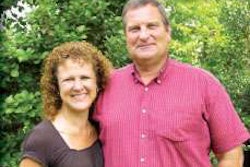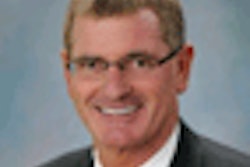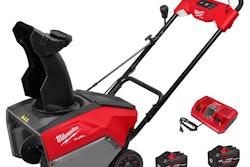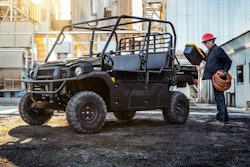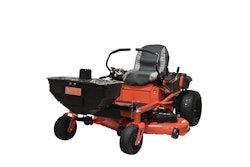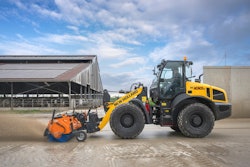New Jersey landscaper achieves business goals by focusing on people.
MARK BORST
BORST LANDSCAPE AND DESIGN
ALLENDALE, NEW JERSEY
Mark Borst’s love of landscaping started early in life, and he never looked back.
As a teenager, Borst mowed lawns and worked under a local landscaper. He started his own company in 1989, Borst Landscape and Design in Allendale, New Jersey, working part-time on small design/build projects while attending school at Bergen Community College and then Rutgers University.
“At that age, I asked questions of everybody I could find,” he says. “I would say yes to a project, then figure out how to do it, and, hopefully, price it OK.”
After graduating with a degree in landscape architecture, Borst began to grow his company in earnest, which consisted of him and a couple of machines. Twenty years later, he oversees a business with nearly 80 employees and an annual volume of $7 million.
Most of the company’s projects are high-end residential. Borst’s crews tackle design/build projects, lawn care, landscape maintenance, garden care and snow plowing, along with offering a company-designed organic lawn care program. He has an in-house mason for small projects, as well as an in-house mechanic.
Employees Come First
When it comes to business, Borst’s main focus is his employees. He attributes his success to the people with whom he’s surrounded himself. “This job is not about landscaping; it’s about people and personalities,” Borst says.
Ninety percent of Borst’s jobs are for residential clients. Of that percentage, about 70 percent involve high-end projects.Borst keeps his eye on ways to build morale among his employees. He’s out in the yard each morning to see the crews off and there in the afternoons when they come in. During the winter, he helps plow commercial lots and goes on sales calls with new designers to offer his knowledge.
He holds a monthly raffle for cash or prizes to encourage timeliness and productivity. Borst awards tickets every morning to crews that leave on time – 10 minutes for maintenance, 15 for construction.
Once a year, the business shuts down for a company trip. Most years, they raft the Delaware River. But last year, they went deep-sea fishing off the Jersey shore. “Half the crew got sick, so I don’t think we’ll be doing that again,” Borst says with a laugh.
Dealing with Space Limitations
To a great extent, space constraints dictate how landscapers in Jersey do business. For example, Borst had to be creative to handle parking issues at his office. Landscaping trucks are staged and parked facing out to save space. He also rents property from a railroad company to extend his parking area adjacent their tracks. Because of parking issues, storing supplies in bulk is not an option. Borst saves room and money by buying directly for each job.
His client base is predominately within a 15-mile radius, and equipment needs also are dictated by space considerations. “Our lawns are small here,” Borst says. He opts for stand-on mowers that are compact enough to handle each job.
In the past few years, Borst’s company has started taking on more commercial work, and as a result, he says his equipment theory may change, though most commercial lots are smaller and mainly asphalt.
Giving Back to His Community
Because of the small size of the area he serves, Borst says community service, through charity work and education, is important.
Borst wants to see continued growth so his employees can reach their goals.
Last fall, the company held a variety of seminars open to the public on subjects ranging from organic lawn care to deer-proofing a landscape. Borst also teaches a site analysis class at the local community college.
Tuned to the Times
Operating in a down economy is new to Borst. “I started the business during the last recession in the early 90s, and I figured that was just how we had to sell,” he says. “I didn’t know any better.” This time around, Borst wasn’t sure what to expect, but he had a plan.
“A lot of times, I think more of the employees than the business.”
“From Day 1, we ran no overtime and had exactly the amount of guys we needed.” He also ramped up his marketing campaign in the spring of 2009.
“If I had to do it over, I should’ve spent more money on marketing our maintenance services instead of on design/build,” he says. Borst began working several years back to grow the maintenance side of his business. “We figured at some point, the well for large projects would dry up.”
Even with estimating a smaller budget for 2009, Borst waited as long as possible before he was forced to lay off a handful of field employees. “A lot of times, I think more of the employees than the business,” Borst says. “I’d rather take a little hit financially than let them go.” Dedicated to keeping his management, Borst replaced the open field positions with office managers.
Regardless of the economy, Borst is content with his company’s annual revenue. His initial goals from 20 years ago have been reached and far surpassed. However, he wants to see continued growth so his employees can reach their goals.
“It’s not just about me, it’s about them,” he says. “It’s about them having a better lifestyle, a better quality of life.”
Borst’s Keys to Success
1 Business Strategy “ The goal was to be a premier landscape contractor to the surrounding community. We service an affluent area and positioned our headquarters appropriately in the territory.”
2 Employees “Hire the most qualified, talented and loyal employees. The goal being to surround myself with people who could flourish within their career specialty.”
3 Services “We offer a full range of high quality services. We are environmentally responsible; our Organic Lawn and Tree Division is a pioneer within our community.”
4 Hard Work ”We are committed to a strong work ethic.”
What was Mark Borst’s biggest mistake?
Early in his experience he stumbled over how to position employees in a way where each person was able to do the job well. He admits he thought most anyone could be a manager. “I lost good employees because I put them in positions they weren’t capable of doing,” he says.
“A lot of times, I think more of the employees than the business.”
Once he righted his mistake, Borst was able to stop micromanaging and successfully hand off responsibility. “If I didn’t have good people I’d be back at the $2 million mark where I was running everything myself,” he says.
By Jennifer M. Holloway



